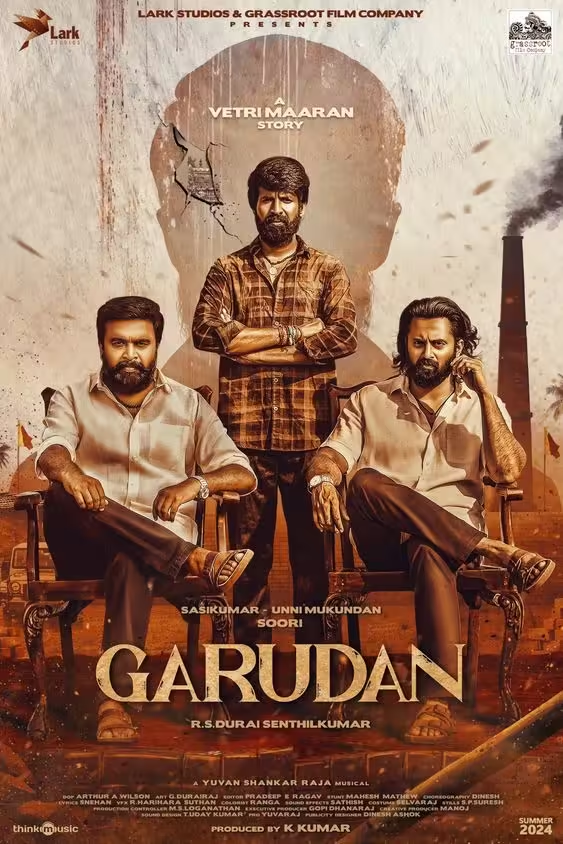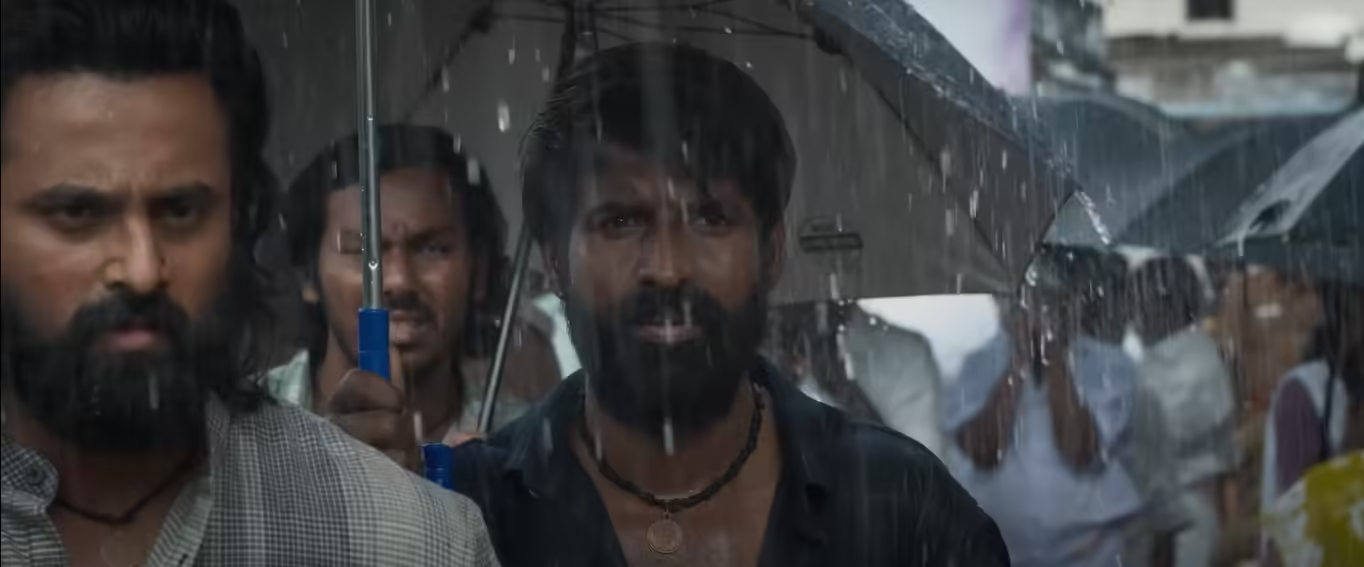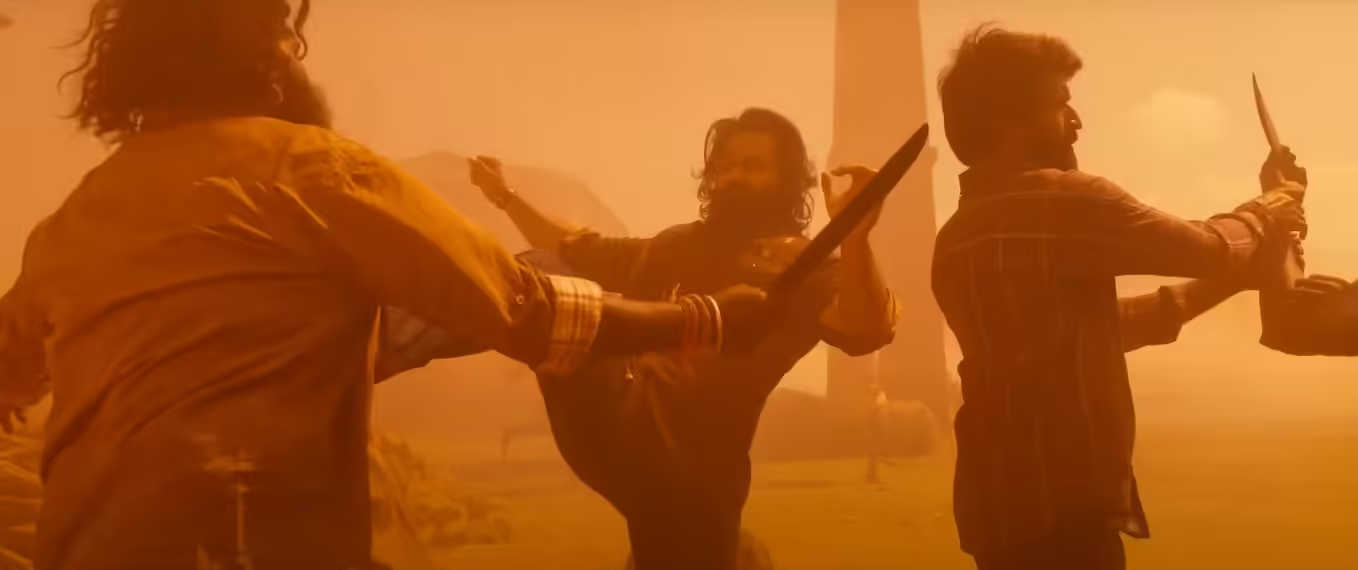
Soori’s performance in the film “Garudan” has been widely acclaimed, showcasing his versatility as an actor. Transitioning from a comedian to a lead role, Soori portrays Chockan, a character whose loyalty and warmth are central to the film’s emotional core. His portrayal in Garudan is noted for bringing a new dimension to the “mass” actor archetype, commanding respect not through aggression but through tenderness and vulnerability. This role has solidified Soori’s status as a formidable actor in the Tamil film industry. Image source: IMDB
Read these first:
- Tamil Movie Review: Why 3 Idiots 2009 is Better Than Nanban 2012?
- Tamil Movie Review: Lovable, Sensible Pasanga 2009
- Tamil Movie Review: Leo 2023 – Rushed, Nothing Fantastic
- Tamil Movie Review: Doctor 2021 – A Cheap Mockery Of Human Trafficking Issue
- Tamil Movie Review: Inspiring Bharath Ennum Naan 2018
Garudan Synposis
“Garudan,” a 2024 Indian Tamil-language film, is a neo-noir action drama that delves into themes of loyalty, betrayal, and survival. Directed by R. S. Durai Senthilkumar and produced by Vetrimaaran and K. Kumar, the film stars Soori, M. Sasikumar, and Unni Mukundan in pivotal roles.
In Kombai, Theni, childhood friends Karuna (acted by Unni Mukundan) and Aadhi (acted by M. Sasikumar), along with Sokkan (acted by Soori), an orphan taken in by Karuna, navigate life’s challenges together. Despite Karuna’s financial struggles as a zamin heir and Aadhi’s relative success, they both wield influence in Kombai as trustees of the Kombai Amman temple. Their lives intertwine with political intrigue when Minister Thangapandi (acted by R. V. Udayakumar) eyes valuable temple land, leading to a power struggle after the death of Karuna’s grandmother, Sellayee (acted by Vadivukkarasi).
Sokkan becomes the temple committee head, supported by Aadhi and Karuna, but faces opposition from Thangapandi’s relative, Nagaraj (acted by Mime Gopi). As Nagaraj and Karuna’s relatives conspire to seize the temple’s treasures, tensions rise, culminating in Aadhi’s decision to hand Karuna over to the police for his suspected involvement in a jewel theft, a move that fractures their deep bond.
In a dramatic turn of events during a temple festival, Aadhi thwarts a heist targeting a jewelry-laden van. A confrontation ensues, with Aadhi battling Nagaraj’s men and Karuna feigning opposition to the thieves. The divine intervention through Sokkan results in Aadhi’s rescue. However, the plot thickens as Karuna, realizing the deed’s safety hinges on Aadhi’s survival, orchestrates a plan to eliminate him.
Despite Aadhi’s wife’s suggestion to use the land deed for community development, Aadhi is mercilessly killed by Karuna and Vairavel (acted by Dushyanth Jayaprakash). Sokkan’s loyalty is tested when he discovers Aadhi’s demise but remains silent. Karuna claims self-defense, evading justice due to lack of witnesses. Aadhi’s son, Samaran, seeks vengeance but is protected by Sokkan, who inadvertently captures Vinnarasi.
Sokkan relocates Samaran to safeguard him, but their cover is blown, leading to Nagaraj’s death at Sokkan’s hands, who then surrenders. A confession from Sokkan implicates Karuna in multiple crimes, including the murder of Sellayee, who opposed his scheme to replace temple jewels with fakes. Evidence of Karuna’s guilt surfaces, but Sokkan flees custody, seeking retribution at Karuna’s brick kiln, setting the stage for a climactic showdown.
In a dramatic turn of events, Sokkan, after being attacked by Karuna upon the revelation of the truth, manages to uncover Vinnarasi’s perilous situation in a kiln chamber. Despite the brutal confrontation with Karuna, Sokkan emerges victorious, rescuing Vinnarasi along with Katyayini and Samaran. The aftermath sees Muthuvel resigning from his position, providing a comprehensive report to his superior.
The narrative takes a twist when the police officer intimates to Thangapandi the dire consequences for him and his associates should Sokkan be convicted. This leads to Sokkan’s release and subsequent reunion with Vinnarasi. The story concludes with Thangapandi suffering a fatal accident, tying up the loose ends of the plot.

In the film Garudan, Soori reveals a new facet of his acting prowess, transitioning from a man under possession to one who aids his dear friends. This marked departure from the comical Subramani character he portrayed in ‘Vennila Kabadi Kuzhu‘ is striking. His transformation in Garudan, characterized by a thick beard, a muscular physique, and a grave expression, has successfully established him as a formidable actor in serious roles. This scene stands as a testament to Soori’s versatility and his ability to adapt to diverse characters, further solidifying his reputation in the acting community. Image source: Youtube
Key Characters
Soori, in a pivotal role, portrays Sokkan, a character whose loyalty is tested amidst a backdrop of betrayal and survival. M. Sasikumar plays Aadhi, one of the childhood friends at the center of the film’s plot, while Unni Mukundan takes on the role of Karuna, the other friend entwined in the film’s central conflict.
The female leads in Garudan include Sshivada as Tamilselvi, Aadhi’s wife, and Roshini Haripriyan as Angayarkanni, Karuna’s wife. Revathy Sharma adds depth to the cast as Vinnarasi, Sokkan’s love interest. The film’s narrative weaves through the lives of these characters, set against the socio-political backdrop of land usurpation and temple politics, providing a rich tapestry for the actors to showcase their skills.

Arthur A. Wilson’s cinematography in Garudan has been recognized for its distinct visual style, particularly in the use of color and lighting to enhance the narrative. His work on films such as ‘Avan Ivan’ and ‘Naan Kadavul’ showcases his ability to create atmospheric and evocative scenes, which is evident in the climax fight scene you mentioned. The choice of an overwhelming orange hue not only heightens the intensity of the moment but also adds a layer of emotional depth, reflecting Wilson’s expertise in visual storytelling. Image source: Youtube
Fight Scenes
The climax fight scene in “Garudan” has garnered attention for its meticulous choreography and execution. Critics have noted the raw intensity and the emotional gravity that it brings to the film’s finale. The scene serves as a culmination of the movie’s central themes of loyalty and betrayal, with the protagonist’s journey reaching a pivotal moment of confrontation. The actors’ performances, particularly during this high-stakes sequence, have been praised for their authenticity and the palpable tension they bring to the screen.
This climactic battle in Garudan is not just a display of physical prowess but also a narrative device that ties together the intricate plot lines, leaving a lasting impression on the audience. The director’s vision for this scene is evident in the careful balance between action and storytelling, ensuring that each punch and each move carries the weight of the characters’ shared histories and conflicts. It’s a testament to the film’s commitment to delivering not only a visually stunning piece but also a story that resonates on a deeper, more personal level with its viewers.
Underlying Message
The narrative in Garudan is set against the backdrop of a temple land ownership dispute, which becomes a battleground for testing the characters’ moral compasses. The film’s underlying message seems to critique the corrupting influence of power and greed, as well as the erosion of traditional values in the face of modern challenges.
It portrays the temple land not just as a piece of real estate, but as a symbol of cultural heritage that the characters are desperate to protect or exploit. Through the lens of its central characters, “Garudan” appears to question the price of loyalty and the weight of betrayal, suggesting that the true test of a person’s character is not where they stand in moments of comfort, but where they stand at times of challenge and controversy.
Final Say
In the cinematic landscape, ‘Garudan’ emerges as a poignant narrative that delves into the complexities of human relationships, set against the backdrop of rural intrigue. The film, directed by RS Durai Senthilkumar, unfolds in the rustic terrains of Theni, where the tranquility of temple lands becomes the battleground for avarice and betrayal. With a storyline that is as much about the endurance of friendship as it is about the fragility of trust, ‘Garudan’ weaves a tale that resonates with the emotional cadence of its audience.
The performances are the linchpin of this drama, with Soori delivering a career-defining portrayal of Sokkan, a character torn between loyalty and righteousness. His transformation from a devoted servant to a man grappling with moral dilemmas underscores the film’s thematic depth. Sasikumar and Unni Mukundan complement this dynamic with their compelling portrayals of Aadhi and Karuna, respectively, bringing to life the film’s central conflict with nuanced intensity. The narrative is propelled by its brisk pacing, ensuring that the audience is riveted from the opening scene to the climactic confrontation.
Yet, it is the film’s exploration of the human condition, through the lens of its richly drawn characters, that leaves an indelible mark. While ‘Garudan’ does not shy away from graphic depictions of violence, which serve to heighten the stakes of its central conflict, it is the emotional undercurrents that truly define the film’s impact. The cinematography in Garudan captures the essence of the rural setting, providing a vivid backdrop for the unfolding drama. The score, punctuated by traditional motifs, further accentuates the film’s cultural roots.
In conclusion, ‘Garudan’ stands as a testament to the power of storytelling, where the interplay of loyalty, deceit, and retribution culminates in a cinematic experience that is both visceral and evocative. It is a film that not only entertains but also invites reflection on the enduring themes of human nature.